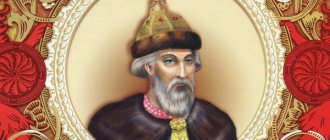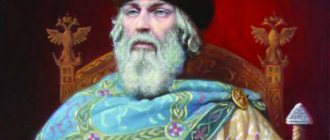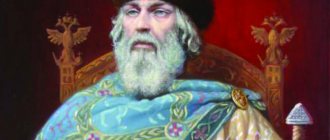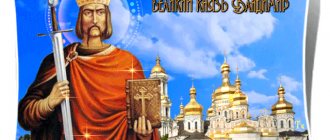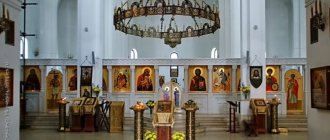Monomakh's reign
In the spring of 1113, after the death of Prince Svyatopolk, the reign of Vladimir Monomakh was to begin. The people of Kiev sincerely wanted to see him on the throne. Just like twenty years ago, the people of Kiev offered Vladimir to lead Kyiv. The prince refused because he never felt a strong desire to rule the entire country. In this case, according to the tradition of succession to the throne, Kiev was to be ruled by David, the eldest son of Igor, brother of Svyatopolk. But the people of Kiev, demanding that the reign of Vladimir Monomakh begin, started riots in the city. Ultimately, Vladimir Monomakh surrendered. And in the same year 1113 he entered Kyiv.
The reign of Vladimir Monomakh can certainly be called one of the most successful in the entire history of Kievan Rus. The reason for this was the prince’s intelligence, as well as his determination. Without a drop of doubt, he punished all the enemies of the country, both external and internal. Monomakh himself, as well as with the help of his sons, won many glorious victories. Monomakh's eldest son Mstislav went on campaigns against Livonia, and each time returned victorious. Monomakh's youngest son George went on campaigns to Bulgaria. These campaigns were also successful. Monomakh's middle son Yaropolk fought in the Polotsk direction. During these wars, he managed to capture three Polovtsian cities. The fame of Monomakh's victories spread throughout Europe. The Greek emperor was very afraid of the growing power of Kievan Rus. And for good reason. Monomakh sent Mstislav, his eldest son, to Adrianaple. Fearing a war with the Russians, the Greek emperor sent rich gifts to Kyiv in order to match Vladimir. Some of the components of these gifts were the orb and sceptre, Monomakh's hat and ancient barmas. It was these items that subsequently became an integral part of Russian statehood. These gifts were delivered personally by the Bishop of Byzantium, transforming the reign of Vladimir Monomakh from princely to royal. The bishop declared Monomakh the king of Rus'.
Monomakh's story about his life
Having begun the story about his life, the prince noted that he began an independent life at the age of thirteen, when his father sent him to Rostov through Vyatichi. Monomakh repeatedly traveled from Chernigov to Kyiv with his father, often made peace with the Polovtsian princes - both with and without his father, and during the wars he killed about two hundred Polovtsian soldiers in battles. In addition, the prince was an avid hunter. Monomakh tells how in Chernigov he “caught wild horses with his own hands,” hunted wild boar, bear, and elk. At the same time, Monomakh did not shift all the responsibilities for running the hunting farm only to the servants; he did a lot himself.
Concluding the story, the prince expresses the hope that his children will not judge him, because the last thing he thought was to show off his courage and valor to them, since he only wanted to glorify God and glorify his mercy. The prince convinced the children not to be afraid of death, because a person will die only if God allows it.
Domestic and foreign policy of Monomakh
The rule of Vladimir Monomakh was not limited to strengthening the borders of the state. The prince cruelly punished everyone who tried to threaten his state. In 1119, the only prince who did not recognize the legitimacy of Monomakh’s power, Gleb, Prince of Minsk, captured the city of Slutsk. The reign of Vladimir Monomakh was cruel but fair. The prince could not tolerate Gleb’s willfulness, so he gathered an army and marched on Slutsk. In the battle that took place, Monoma won. Gleb was captured and taken to Kyiv, where he died in 1119.
The reign of Vladimir Monomakh continued and further strengthened the Russian state. The citizens of Kyiv hoped that Vladimir would remake the system of inheritance of power in order to avoid future wars between brother and brother. But Monomakh, who passionately loved his country, did not do this. The reasons for this are very clear. It was absolutely obvious that changing the system of succession to the throne would cause a new internecine war on the part of absolutely all the princes of Rus', who would not want to lose their right to the Kiev throne.
The reign of Vladimir Monomakh was glorious, which can easily be characterized by a period of truce within the country. The citizens of the world waited a long time, and now, with Vladimir coming to power, they got it. Monomakh himself lived 73 years. On May 19, 1125, Vladimir went to the bank of the Alt River, to the church that was built there on his orders. At the entrance to the church, in the very place where Prince Boris was once killed, Vladimir Monomakh died.
Teachings of Vladimir Monomakh
Anticipating his imminent death, the Grand Duke of Kiev Monomakh left the written teaching of Vladimir Monomakh to the children. This work, compiled by Vladimir, touched on many topics, but the main meaning of the teaching to children was to convey to them the laws of God and teach them how to govern the state fairly. Vladimir Monomakh's teaching to children began with a brief description of Vladimir's life. He wrote that at his birth Yaroslav the Wise, Vladimir’s grandfather, gave him the name Vladimir, and his parents added the nickname Monomakh. The reasons for the appearance of this nickname are not specified, but most likely it is due to the fact that Vladimir on his mother’s side was a descendant of the Byzantine emperor - Monomakh.
Further, the teaching to the children continued with a call to rule fairly and sacredly to honor and fulfill those provisions that the teaching of Vladimir Monomakh carries. Vladimir demanded to sacredly honor the promises reinforced by kissing the cross, and never break them. After the famous Lyubechsky Congress, internecine warfare broke out with renewed vigor in Rus', but Vladimir, who sacredly honored the promise he had made, did not stain his hands with the blood of his brothers. Vladimir Monomakh continued teaching children with a call to take care of the people, to be open to their needs and to show their benefactors in every possible way. “Be fathers for your people, honest and fair, do not kill innocent people and protect the weak,” Vladimir wrote.
Wars were an integral part of that time. Therefore, the teaching to children continued with instructions on how to behave in battles and campaigns. Vladimir’s teaching said that in a campaign and in battle you need to be brave and infect everyone else with it. You need to be wise, because great victories are achieved only with the mind. Vladimir urged his sons to be an example for his soldiers in everything and in battle not to hide behind the commander, but to get ahead of him. During the rest, the children continued to be taught that they need to rest, but not take off their weapons, since the enemy and death like to appear suddenly. In battle and peace, Vladimir Monomakh continued, one must rely on God in everything and hope for his intercession. You should not take care of yourself or be afraid of anyone, man or beast. God always protects the brave and does not allow them to die. Describing His campaigns, Vladimir wrote that there were 83 of them in total. And these were only large ones; he didn’t even keep count of the small ones. And in each of these campaigns, Vladimir was the first among his troops. Vladimir Monomakh's teaching to children completed the military theme, as well as the theme of life and death, with the fact that you need to be brave and not be afraid to die with honor. The conduct itself determines the fate of a person, and if he wants the person to die, then nothing will save such a person, neither armor, nor the strong walls of the castle, nor other people.
In a separate line, Vladimir Monomakh’s teaching to children contained a call to acquire knowledge. Vladimir wrote to his children to constantly seek new knowledge: “You must remember for the rest of your life what you have learned. And what you don’t know, you should strive to find out so that you never forget.” Vladimir himself religiously followed this rule. According to the chroniclers, he was an extremely educated man. This also applies to his father, Vsevolod Yaroslavich, who, even sitting at home, as Vladimir said, knew five foreign languages, which earned him the love and respect of other princes and kings of neighboring powers.
Vladimir Monomakh’s teaching to children ended with a call to love. Vladimir wrote to his sons so that they should love not only their brothers, but also their entire people, their wives and children, and also honor their parents. Every wanderer should be greeted with love, since it is wanderers who spread the glory of other states to other countries. And it is the warmth of their reception that determines whether this glory will be good or bad.
Vladimir Monomakh’s teaching to children has been preserved to this day in the so-called Laurentian Chronicle. The uniqueness of this document is that it allows us to draw a reliable conclusion about what kind of person Vladimir himself was: brave, honest, fair and loving.
Letter from Monomakh to Oleg Svyatoslavich
The third part of the “Teachings” is a letter to Oleg Svyatoslavich, which Monomakh wrote shortly after the tragic events of September 6, 1096 in Murom, where Monomakh’s son died in a battle with Oleg. After listening to the advice of his eldest son, who was baptized by his cousin Oleg Svyatoslavich, the prince wrote him a letter in the hope of reconciliation. The prince advises Oleg to send his daughter-in-law, the widow of the murdered man, to him, because this is what their fathers and grandfathers did when they wanted to make peace. Since the dead can no longer be brought back, and judgment comes from God, and not from the one who killed, then one must turn to God, who can enlighten and guide the steps of sinful man. Concluding the message, Monomakh told his brother that he strives for the good of all the brothers of the Russian land, and begs him not to try to get by violence what can be obtained as a sign of sincere care and blood ties.
Get paid for your student work
Coursework, abstracts or other works
Charter of Vladimir Vsevolodovich
“Kill neither the right nor the wrong, and do not command him to be killed; even if you are guilty of death, do not destroy any soul.” Vladimir Monomakha
The Charter of Vladimir Vsevolodovich is one of the sections of the ancient Russian code of laws, Russian Pravda. It was compiled at the beginning of the reign of the Kyiv prince Vladimir Monomakh (1113-1125) with the aim of changing some of the economic, criminal and social norms. Articles of the Charter regulated the resolution of property conflicts, improved the position of the lower classes, and limited the influence of feudal lords and moneylenders.
Reasons for creating the Charter
The unified set of laws of Rus' before Vladimir Monomakh was the Russian Truth in the Long Edition. It was established at the beginning of the 11th century by Prince Yaroslav the Wise. A hundred years later, many of the norms in this collection could no longer clearly regulate the changed relations in society.
Vladimir Vsevolodovich’s charter was adopted under the pressure of aggravated social contradictions. Increased taxes led to impoverishment of the population. The people of Kiev were forced to borrow from moneylenders at interest. The indignation of the population in 1113 grew into an uprising. Vladimir Vsevolodovich, who accepted the Kiev throne after the death of his cousin Svyatopolk, began his reign by developing new laws.
Document structure
The earliest source containing the new laws of Monomakh is the Trinity List of the Extensive Truth, dated to the 14th century. The original text is not divided into articles, so the beginning of the section is considered to be the red heading “Charter of Vladimir Vsevolodovich.” The code contains the following documents:
- Charter on cuts (debt interest);
- Law on Debts and Bankruptcy of Merchants;
- Charter on purchases (ruined peasants working off their debt to the feudal lord).
Many historians suggest that Articles 53-66 directly relate to the Charter of Monomakh. A number of researchers claim that the entire second part of the Extensive Truth, up to article 121, was compiled during the reign of Vladimir Vsevolodovich.
Features of the work
The historical source demonstrates that Monomakh took part in many campaigns and concluded dozens of agreements. The prince himself talks about this. It cannot be argued that all the author’s actions are objectively fair. But they always express the interests of his country. So, after accepting a request for help from an impostor claiming the throne of Byzantium, Monomakh understood that there was a deception. The fighting between Constantinople and Kiev ended in the absence of serious successes, and the agreement was sealed by a dynastic marriage.
Vladimir Vsevolodovich was an educated man. His work contains many quotations, especially from the Bible. This confirms not only that the ruler has developed morality, but also that he studied the issue before writing his will to his children. Many Russian cities are mentioned in the essay. Some of them became large centers, for example, Kursk, Novgorod, Vladimir, Rostov. Others have lost their former significance. Their examples are Starodub, Berestye, Kordno. Thanks to the prince's notes on hunting boar, deer, and aurochs, scientists drew conclusions about their habitats. It turns out that with the help of a literary monument various sciences received information.
It is impossible to read the ancient text in the original without special preparation. The reason is that there is too much difference between the Russian language of the twelfth century and the modern one. It is expressed not only by writing, but also by pronunciation. For example, the letters “nos small” and “nos big” have disappeared, and the letter “yat” has long been missing. Modern readers do not know what sounds used to indicate hard and soft signs.
Reading the original text poses a serious problem. Therefore, translations are used for analysis. Adaptations usually come with a lot of notes. This greatly simplifies working with text. Comments are written by professional historians. This allows you not to turn to the encyclopedia and other sources when studying each question. Despite the huge difference in spelling, there have been no significant changes in the structure of Russian grammar. This situation provides the opportunity to see the stylistic features and literary devices used by the author.
Contents of the Charter
The first articles adopted by Monomakh regulated the payment of interest on debts. A creditor who took third interest twice a year had the right to receive only the initial amount of the debt. A debtor who paid third interest three times a year was exempt from returning the capital itself.
New laws determined the rights of purchasers - people who became dependent on the feudal lords due to non-payment of debt. “Purchases in money” preserved the right to personal freedom and could not be sold. “Role purchases” received from the lender land, which they cultivated in payment for the debt, as well as livestock and equipment. They could not leave without returning the property to the owner. The powers of landowners were limited - it was not allowed to punish purchasers without guilt, give them as collateral or sell them into slavery.
The charter of Vladimir Vsevolodovich defined situations in which a free smerd could become a serf (slave):
- marriage with a servant without a contract;
- selling yourself or your child into serfs;
- escape of the purchase from the owner;
- service as a tiun without a contract of freedom.
The second and third parts of the Charter complement the norms of the Russian Truth on property and the protection of personal honor. The fourth section clarifies the powers of witnesses in court and the amount of court fees.
Analysis
From the very beginning of the Instruction, Monomakh points out the testamentary nature of his edification. According to ancient Russian custom, the body of the deceased was transported to the burial site on a sleigh. Their mention means the approach of death. This gives a special meaning to everything the ruler talks about. Behind his words is the life he lived honestly, which gives him the right to make covenants. For Vladimir Vsevolodovich, all the other princes were children. Therefore, the appeal is addressed to all rulers. The author urges them to remember their purpose and to be faithful servants of the interests of their native land.
The appeal to the Bible is clearly visible. Monomakh builds his entire understanding of the behavior of rulers on its basis. He evaluates everything he has done and invites others to continue his path. In the “Teaching” the prince appears as a man familiar with book traditions and possessing the gift of words with poetic figurative speech. He creates a special language that has become an example of mastery of artistic speech.
For greater persuasiveness, the author uses examples from his own life and gives a list of hikes. This proves that he himself adhered to the rules that he recommended others to follow. Monomakh calls not to indulge in laziness, to delve into all state affairs yourself, to avoid senseless bloodshed in order to understand the reasons for what is happening and behave correctly. This is how the author concludes his essay, showing the desire to leave a mark after himself, to convey life experience to those who receive responsibility for the fate of Rus'.
The author mentions the need for princes to be responsible before God, since they received power from above. There is a noticeable connection between the Instruction and other similar works of medieval literature. But the Russian ruler did not create a literary work. He tried to convey to his descendants the spiritual and political experience that he had acquired at a high price. Vladimir Vsevolodovich warned those who received power against repeating their own mistakes.
The “Instruction” met the political needs of the time. It says that what their life will be depends on the unity of the people and the country. The autobiographical work reflects state realities and problems, facts from the personal biography of the great figure.
Understanding the meaning intended by the author is achieved by studying not free interpretations, but original documents. Therefore, the study of other texts from different eras also deserves attention.
The meaning of the Monomakh Charter
The laws adopted by Vladimir Vsevolodovich helped eliminate socio-political tensions in the country. The definition of the rights of purchasers, serfs and serfs protected them from the arbitrariness of the feudal lords. The settlement of financial and credit issues stabilized the Russian economy. The charter of Vladimir Vsevolodovich was used in the legal practice of ancient Rus' until the establishment of the Tatar-Mongol yoke.
Source.
